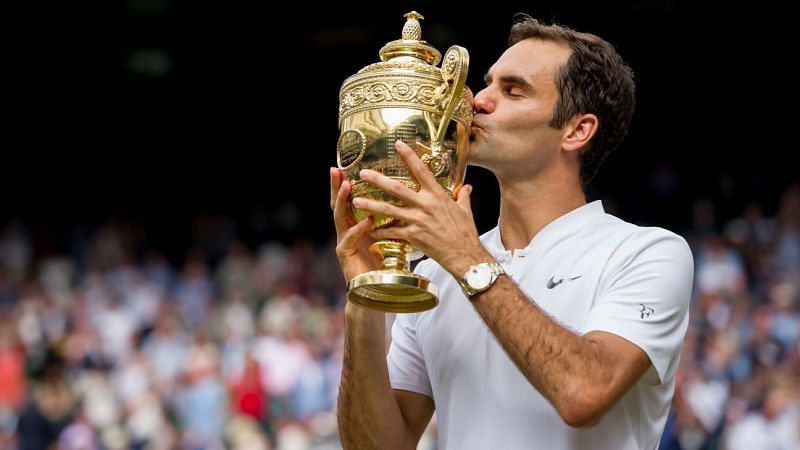
Roger Federer's 5 greatest comeback wins at Wimbledon

With eight Wimbledon titles to his name, Roger Federer is the undisputed king of SW19.
No male singles player has dominated as much on the surface as the Swiss maestro has. Roger Federer won five consecutive titles at Wimbledon from 2003-2007 and triumphed at the grasscourt Major again in 2009, 2012 and 2017.
Roger Federer has also finished as the runner-up at Wimbledon on four occasions, doing so in 2008, 2014, 2015 and 2019. The most recent such occasion - last year - witnessed the then 37-year-old squander multiple championship points on serve against Novak Djokovic before going down in a historic first-ever fifth set tiebreak.
The 20-time Grand Slam champion has a record 101 match wins and 13 losses from 21 consecutive appearances at Wimbledon starting in 1999. During this period, Roger Federer has won 77 matches in straight sets - which as a standalone tally is more than Novak Djokovic's total match wins (75).
However, Roger Federer hasn't always had it easy at his favorite Grand Slam tournament. Three of Roger Federer's seven five-set wins at Wimbledon have been from two-set deficits, and out of Federer's 17 four-set match wins at SW19, six came after he dropped the opening set.
The Swiss legend has made a record nine comebacks from two sets down at Grand Slams (10 overall), and is one of four active players to have done so at all four Majors. On that note, let's take a look at Roger Federer's five most epic comeback wins at Wimbledon.
Roger Federer's five greatest comeback wins at Wimbledon
5) 2010 1st round: Beat Alejandro Falla 5-7, 4-6, 6-4, 7-6(1), 6-0
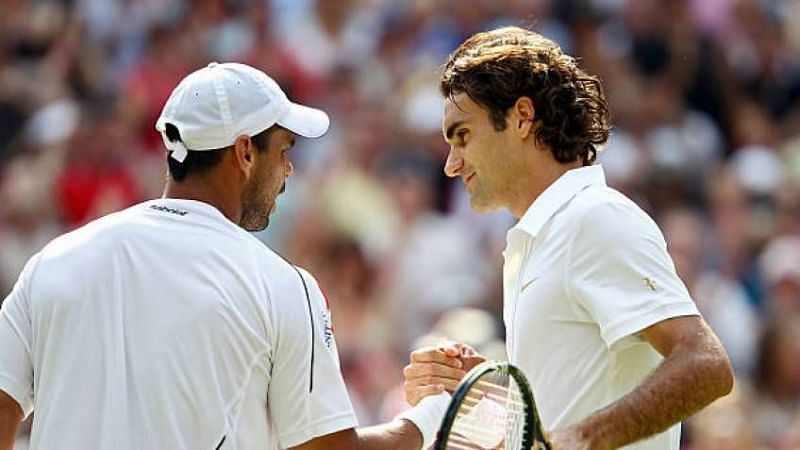
Weeks after enduring a defeat to Lleyton Hewitt in the Halle final, Roger Federer's uncharacteristic errors against unheralded Colombian Alejandro Falla in the Wimbledon first round looked set to derail his grasscourt season completely.
It was expected to be smooth sailing for Federer, who had beaten the Colombian in their three previous meetings without dropping a set. But the going proved to be anything but straightforward for the then 16-time Grand Slam champion.
Roger Federer struggled for fluency on his favorite court, losing serve in the 11th game of the first set to drop the opener. That was the first time in eight years that Federer had dropped a set in the Wimbledon first round.
Centre Court awaited a response from the six-time champion, but it was Falla instead who served out a two-set lead after saving two break points.
Unforced errors continued to rain down from the Roger Federer racquet in the ninth game of the third set as the 28-year-old conceded four break points in that game. But he managed to hold serve and then produced a forehand winner in the next game to reduce the arrears to one set.
However, Roger Federer failed to ride his momentum. Falla broke his Swiss opponent in the first game of the fourth and served for the match at 5-4 as a monumental upset upset loomed. Not since 2003 had a reigning Wimbledon champion been dumped out in the first round.
It was at this moment that Roger Federer's fighting qualities came to the fore. He broke Falla back and saved a break point in the next game to hold serve.
The Colombian held serve to force a tiebreak but his moment had come and gone. Federer dropped just one point in the tiebreak and blitzed through the fifth to live to fight another day.
After the win, Federer remarked that he was 'lucky' not to lose:
"I definitely got very lucky out there. For some reason, I wasn't able to read his serve. That really rattled me. I had to look for that for a long time. Thank God I found it eventually. For me, it's not normal to be down two sets to love, especially at Wimbledon, and early on in Grand Slams. My whole game was sort of in disarray."
Falla was gracious in defeat despite admitting that nerves caught up with him at the most inopportune moment - when he served for the biggest victory of his career.
"I was thinking that I have a big opportunity to beat Federer here, I just doubted a little bit at that moment for the first two points, and then he played good points. But I am happy because I played a great match. Today is a special day for me in tennis, even if I lost that match. I can say I was serving for the match against Federer. Many players would like to be in that situation."
4) 2012 3rd Round: Beat Julien Benneteau 4-6, 6-7(3), 6-2, 7-6(6), 6-1
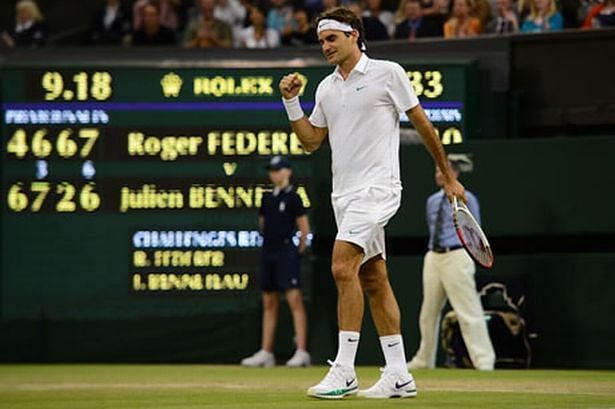
Having failed to win a Slam for two and a half years, Roger Federer's barren run looked set to continue when he fell behind by two sets against Julien Benneteau in the 2012 third round.
It was the Frenchman who made the early move, breaking Federer at 4-4 in the first before taking the opener. Then in the second set, the two players exchanged breaks of serve before it was Benneteau again who played the better tennis in the tiebreak to take a commanding two-set advantage.
Roger Federer kick-started his comeback by taking the third set for the loss of just two games. But in a tense fourth set, Federer was within two points of defeat on six occasions. He hung on for dear life, and eventually won the tiebreak 8-6 to produce a fifth.
There was no looking back from there. Roger Federer conceded only one game in the decider against an injured Benneteau, to avoid a third round exit at a Grand Slam for the first time since Roland Garros 2004 (lost to Gustavo Kuerten).
Benneteau said about the match:
"He's like a rock. If your level is a little bit lower, he takes the opportunity. Every point against him, you cannot make a mistake. If you do not put the ball in the right place, you lose the point nearly every time.”
Roger Federer also acknowledged the magnitude of his win as he described the recovery from two sets down.
“When you're down two-sets-to-love, stay calm. Obviously your friends and family are freaking out. You just play point for point. It sounds boring, but it's the only thing to do… Tonight, it was special.”
A day after Rafael Nadal was dumped by Lukas Rosol in the second round, Roger Federer avoided an early exit by the skin of his teeth. The win over Benneteau rejuvenated the Swiss, who beat Novak Djokovic and Andy Murray in the semifinal and final respectively to tie Pete Sampras' record of seven Wimbledon titles.
The title run also returned Roger Federer to the top of the ATP singles rankings.
3) 2016 Quarterfinal: Beat Marin Cilic 6-7(4), 4-6, 6-3, 7-6(9), 6-3
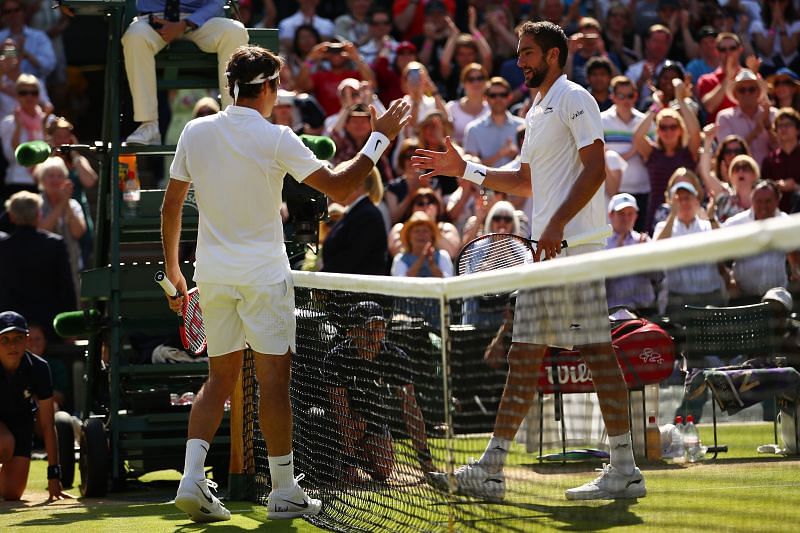
For only the second time since his epic comeback against Alejandro Falla in the 2010 first round, Roger Federer found himself in a two-set deficit at Wimbledon. He dropped the opening two sets against big-serving Croat Marin Cilic in the 2016 quarterfinals, and seemed to be staring at near-certain defeat.
For large swathes of the match, Cilic was the better player. He clinched the first set on a tiebreak and rode a lone break in the second to take a commanding two-set lead.
Cilic kept pounding his opponent's serve and eked out a 0-40 lead in the seventh game of the third. The writing seemed to be on the wall for Roger Federer, but he was not prepared to throw in the towel just yet.
Roger Federer erased one of the break points with an imperious half volley and another with a vicious topspin forehand as he held serve for 4-3. Cilic, seemingly rattled, double faulted to lose serve in the next game and Federer served out the set to regain a foothold.
However, Cilic wasn't going anywhere. The Croat saw a match point on the Roger Federer serve at 4-5, and another at 5-6. But the six-time champion hung on to force a tiebreak.
In an epic 20-point tiebreak, Roger Federer saved another match point before producing the point of the match at 9-9. Forced to retrieve a deep groundstroke on his forehand wing, Roger Federer hit a low crosscourt running forehand to force an error from Cilic. A point later, Federer forced a decider as Centre Court burst into delirium.
The momentum was now strongly in Roger Federer's favor. Cilic surrendered serve in the eighth game of the fifth, and that was the only opening Federer needed. He served out the victory without much fuss to reach a record-extending 11th Wimbledon semifinal.
With the win, Roger Federer equaled Boris Becker and Aaron Kirkstein's record of 10 comebacks from two sets down. The seven-time champion acknowledged his difficulties in the match when he said:
“I just remember being in trouble the whole time. Today was epic. Probably going to look back at this as being a great, great match I played in my career ... To win a match like this, to test the body, to be out there again, fighting, being in a physical battle and winning. It’s an unbelievable feeling.”
However, that turned out to be the last win of the season for Roger Federer. The Swiss proceeded to squander a two sets to one lead against Milos Raonic, to lose his first Wimbledon semifinal in 11 attempts.
The Swiss maestro then underwent a surgery and didn't play another match in the year.
2) 2012 Final: Beat Andy Murray 4-6, 7-5, 6-3, 6-4
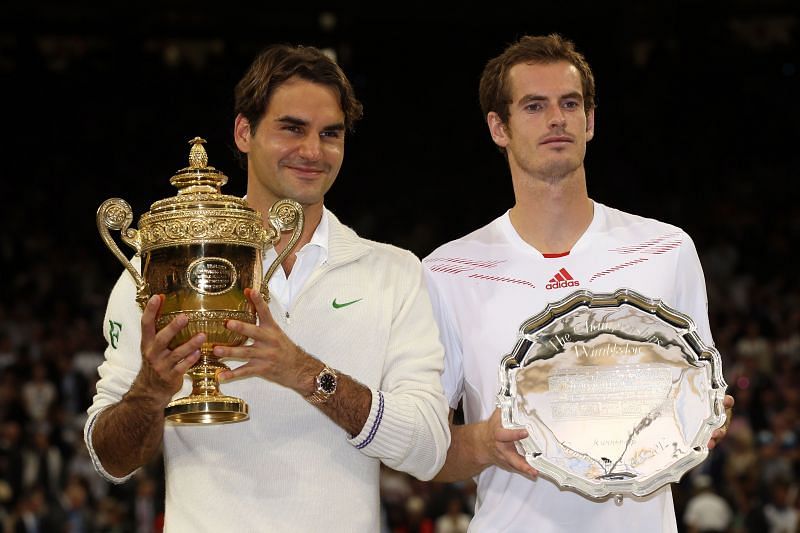
In his first Wimbledon final in three years, Roger Federer made a slow start against local hope Andy Murray. Following an early exchange of serves, Federer dropped serve in the ninth game to lose the opener 4-6 and cede the early advantage to his opponent.
Murray saw a pair of break points come and go in the fifth game of the second set, and another two at 4-4. The six-time champion hung on gamely to stay ahead in the set despite struggling to find his A-game.
Roger Federer then recovered from 15-40 down on Murray's serve at 5-6 before leveling proceedings with a drop volley winner.
The heavens soon opened up, and the controlled playing conditions under the closed roof helped Roger Federer rediscover his mojo even as Murray's level dropped. In a 20-minute sixth game in the third set, Federer converted his sixth break point opportunity to surge ahead. Another break of serve late in the set helped the Swiss maestro take a crucial two sets to one lead.
To his credit, the first British men's singles finalist at Wimbledon in 74 years tried to hang on. But he fell behind an early break in the fourth, and that was that. The lone break sufficed for Roger Federer as he served out the match to end a two and a half year Grand Slam drought and clinch a record-equaling seventh Wimbledon.
A tearful Murray said about his defeat to Federer:
"Everybody always talks about the pressure of playing at Wimbledon, but it's not the people watching - they make it incredible. There are mixed emotions. Most of them are negative. The reaction from the crowd was great. I felt like I was playing for the nation and I couldn't quite do it."
1) 2009 Final: Beat Andy Roddick 5-7, 7-6(6), 7-6(5), 3-6, 16-14
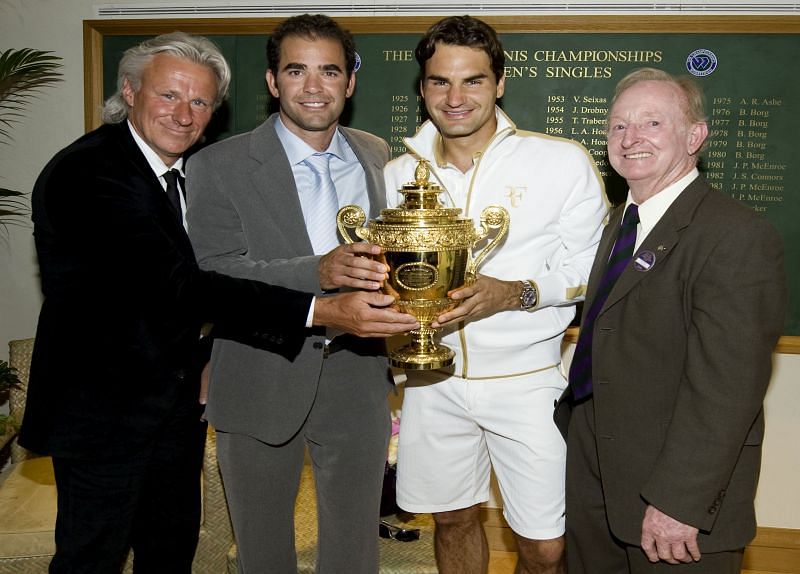
In his seventh consecutive Wimbledon final, Roger Federer faced old rival Andy Roddick for the third time in a title match at the grasscourt Major.
Having won the elusive Roland Garros title just weeks earlier to complete the coveted Career Grand Slam, Roger Federer was a win away from breaking a tie with Pete Sampras (14) for most Slam titles overall.
It was Roger Federer who eked out the first break points of the match, at 5-5 on Roddick's serve. But twice the five-time champion was denied by Hawkeye, and the American erased the other two with big serves.
Federer rued squandering his opportunities as consecutive forehand errors in the next game saw Roddick take a surprise one-set lead.
In a competitive second set, neither player yielded a break point as Roddick landed 80% of his monster first serves. A nervy forehand from Roger Federer gave Roddick the first minibreak of the ensuing tiebreak, and the American soon arrived at 6-2 - and four consecutive set points.
However, Roger Federer unfurled a gorgeous backhand and two service winners to erase the first three set points. Then a net-rushing Roddick made an error on a high crosscourt backhand volley, which continues to haunt him till date.
A Federer backhand pass and a long backhand from Roddick meant that the five-time champion had reeled off six consecutive points to steal the second set.
Roddick returned to the wrong end at the start of the third set, and looked visibly deflated. Roger Federer on the other hand was now on clutch serving mode, as he conceded only two points on it to force a second consecutive tiebreak.
It was Federer who made the first move, taking the early mini-break before converting his third set point and carving out a two sets to one lead.
However, Roddick was not done just yet. The American produced only the second break of the match to go ahead 3-1 in the fourth. He then served out the set without much trouble, as Wimbledon experienced a third consecutive final go the distance.
Serving first in the fifth, Roger Federer forced another break point on the Roddick serve but was thwarted for the sixth time. The match entered a fourth hour without Federer managing to break his opponent's serve even once.
It was now the turn of Roddick to put pressure on Federer. At 8-8, a backhand winner from the American gave him his fourth and fifth break points of the match. But Roger Federer responded in imperious fashion.
A service winner and a nerveless drive volley brought Federer to deuce, and Roddick wouldn't come close to breaking the Swiss again.
When Federer held serve for 11-10, the fifth set broke the 20-game record held by the 1927 Roland Garros final for the longest set in a Grand Slam final in terms of games. After Roger Federer fired three consecutive aces to go ahead 13-12, the 2009 Wimbledon final became the longest Grand Slam final in history.
With Federer continuing to chip away on the Roddick serve, the pressure of serving behind told on Roddick. He looped a forehand long at 14-15 deuce to give the five-time champion a crucial break point match. And when the American repeated the same error in the next point, Roger Federer became the standalone all-time Grand Slam title leader.
The loss made Roddick the only player in history to lose a Grand Slam final after dropping serve just once in the match.
After the win, which returned Federer to the top of the world rankings, the Swiss remarked that the idea of breaking records was not the only thing that kept him motivated.
"It's not one of those goals you set as a little boy but it's been quite a career and quite a month. This is not why I'm playing tennis, to break records, and this doesn't mean I'm going to stop playing tennis. I hope to come back for many years."
True to his words uttered more than a decade ago, Roger Federer remains a potent force at Wimbledon even today.